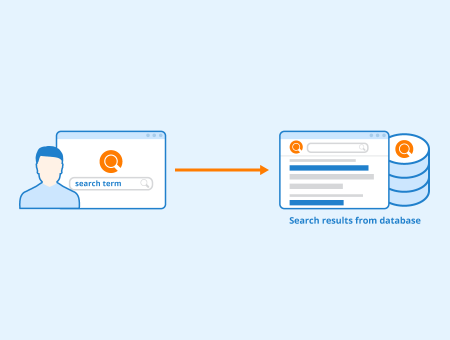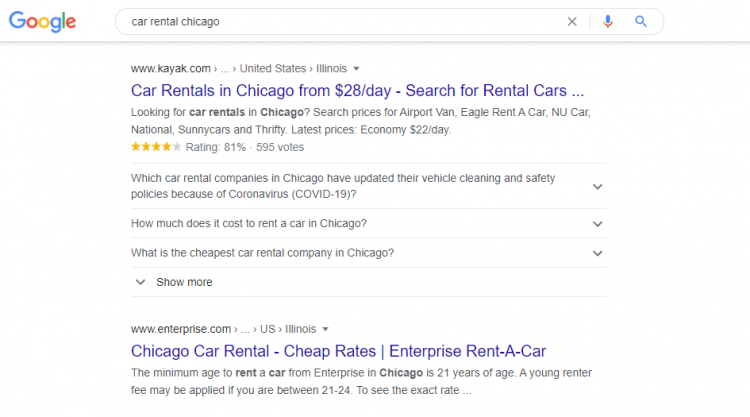Difference between revisions of "Search Engine"
(→Similar articles) |
|||
| Line 86: | Line 86: | ||
} | } | ||
</script></html> | </script></html> | ||
| + | |||
| + | {| class="wikitable" style="text-align:left" | ||
| + | |- | ||
| + | |'''About the author''' | ||
| + | |- | ||
| + | | [[File:Seobility S.jpg|link=|100px|left|alt=Seobility S]] The Seobility Wiki team consists of seasoned SEOs, digital marketing professionals, and business experts with combined hands-on experience in SEO, online marketing and web development. All our articles went through a multi-level editorial process to provide you with the best possible quality and truly helpful information. Learn more about <html><a href="https://www.seobility.net/en/wiki/Seobility_Wiki_Team" target="_blank">the people behind the Seobility Wiki</a></html>. | ||
| + | |} | ||
| + | |||
| + | <html><script type="application/ld+json"> | ||
| + | { | ||
| + | "@context": "https://schema.org", | ||
| + | "@type": "Article", | ||
| + | "author": { | ||
| + | "@type": "Organization", | ||
| + | "name": "Seobility", | ||
| + | "url": "https://www.seobility.net/" | ||
| + | } | ||
| + | } | ||
| + | </script></html> | ||
Latest revision as of 17:18, 6 December 2023
Contents
What is a search engine?

A search engine is a tool used to help find a piece of content in a larger database, usually based on a written word or phrase provided by the user. Search engines are predominately used online for searching for particular web pages, or searching for applications in an app store, for example.
Examples of search engines that are commonly used are Google, Bing, Yahoo, and YouTube. However, there are search engines on a range of different sites and platforms, like the search feature on social media channels, or the search feature on news sites.
When using these search engines, you provide the search engine with a word or phrase you want more information about, or a question you have. The search engine then provides you with a page containing the most relevant results for the term you entered. This prevents you from having to go through the huge number of pages manually, which is often impossible when working with large databases.
The process starts with ensuring the search engine has a large database that contains all important content but also encompasses the understanding of what the term you searched means, what your reason for searching a specific term is, and how to provide you with the best possible results for the term you entered.

Screenshot of the Google search engine, showing a search for “car rental chicago”
How do search engines work?
There are two main steps to how a search engine works. The first of these is the discovery/indexing step. The second is the sorting of the results.
Discovery & indexing
Search engines need to have a large database of websites and webpages to be able to find the most relevant results. Different search engines have different methods for discovering new content to add to their database. For example, Google uses a bot called Googlebot to crawl pages on the web.
Very simply put, crawling is the process of an automated program ‘clicking’ links on websites and then taking a snapshot of the page before moving on to the next link. This enables Google to find websites and webpages that aren’t submitted to them manually, which helps to improve the diversity of content they can potentially show to the user.
YouTube, on the other hand, doesn’t crawl the entire web. YouTube allows users to add videos and content to their database manually. It’s the same with the search engines on many smaller sites/platforms, as well as the search engines on social media websites or the app store. These all require users to submit content in order to be added to their database.
After discovery, the next step is indexing. In this step, the page is added to the database and is therefore eligible to appear in the search results. On some platforms, this happens automatically. However, some search engines, like Google, don’t index every page they crawl. This could be due to webmasters not allowing Google to crawl or index the page, or it could be due to another reason.
Sorting the results
Sorting the results based on a term provided by the user is a highly complex part of the search process. There are two main parts to this. The first is understanding what the searcher wants to find based on the word or phrase provided. The second is finding the most relevant pages to show based on this term.
Understanding the search term
Understanding the search term and the reason you are searching for something is a big challenge to search engines. Many words and phrases have multiple meanings, and there are also factors like personal circumstances and local/global trends to consider (among many others). Search engines are constantly trying to improve their understanding of the search terms provided by users, the context, and the searcher’s situation. Lately, this has led to search engines like Google localizing certain search results based on the user’s location, as well as using data about the searcher’s previous searches and clicks to customize the results based on their situation. If they know where you are and what you’ve been searching for previously, they are in a better position to understand the search term and the search intent.
Finding the most relevant pages
Next, the search engine needs to find the most relevant and helpful results in its database. They do this using a whole host of different factors, which are also called ranking factors. One of these factors is the inclusion of keywords, which tends to be a good indication of relevance. If a webpage contains the same word as the word that is searched or words that mean the same thing, it can be a strong indication to a search engine that the content on the webpage is relevant. The factors used to determine the position of webpages are constantly being revised and improved by search engines to provide the searcher with the best possible user experience. SEO is the process of optimizing your website for these different ranking factors.
What search engines are there?
There are thousands of different search engines, for example, search engines focused on social media platforms, webpages, videos, and many more. Below are the top five largest search engines by market share[1]:
- Bing
- Baidu
- Yahoo!
- Yandex
Why are search engines important for SEO & marketing?
Search engines are where potential clients and customers go to find companies, ask questions, and go shopping. They have become one of the most important ways people use the web, with over 3.5 billion searches per day on Google alone[2]. This is by far the most important reason why search engines are so important in marketing since they provide an avenue for easily and cost-effectively getting in front of potential clients by optimizing your site for search engines, also called SEO.
SEO is the practice of optimizing your website and webpages for search engines. This helps you to be more visible on Google and other large search engines and can drive a significant number of visitors to your site. There are different types of SEO that each focus on a different type of ranking factor. These are Technical SEO, on-page SEO, off-page SEO and local SEO. Each of these SEO disciplines can individually help your website improve its rankings, but are most effective when combined into a complete SEO strategy.
Search engines are also becoming an increasingly large part of other marketing channels, like social media marketing. This is due to larger amounts of content on these platforms and therefore a growing need to sort and filter content. This has led to SEO becoming more important for marketing channels other than Google, Bing, and other traditional search engines. New voice-operated devices are also changing the search landscape, with longer spoken search terms becoming more common on both small and large search engines.
References
- ↑ Worldwide desktop market share of leading search engines from January 2010 to October 2020 Statista. Retrieved 30 December 2020.
- ↑ Google Search Statistics internetlivestats. Retrieved 25 January 2021.
Related links
- https://developers.google.com/search/docs/basics/how-search-works
- https://www.searchenginejournal.com/going-beyond-google-comprehensive-list-search-engines/123880/
Similar articles
| About the author |
 |